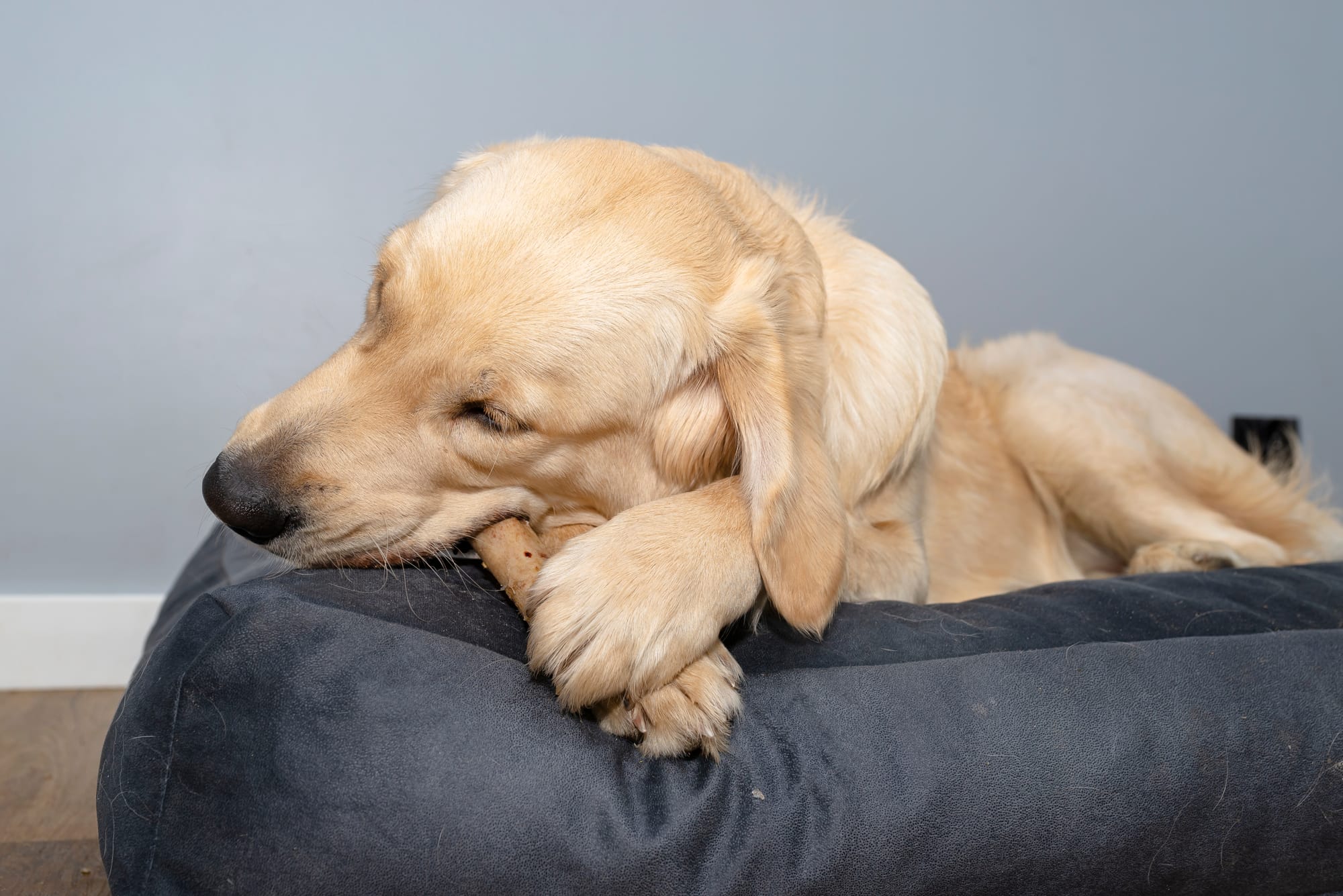Welcoming a new puppy into your home can be an exciting and joyful experience. However, when your furry companion starts to exhibit signs of diarrhea, it's natural to feel concerned. Diarrhea in puppies can occur for a multitude of reasons, some benign and others more serious.
In this guide, we'll delve into the importance of veterinary consultation, the common causes of diarrhea in puppies, including viral and bacterial infections, parasites, stress, and diet, and offer insights into prevention and management strategies.
Prioritizing Veterinary Involvement
It is essential to involve a veterinarian when your puppy has diarrhea, particularly if it persists or worsens over time. A veterinarian will conduct a thorough examination, order necessary tests, and recommend appropriate treatment based on the underlying cause.
By seeking timely veterinary care, you can prevent complications, ensure the well-being of your puppy, and have peace of mind knowing that your furry friend is receiving the best possible care.
Decoding the Causes: Why Puppies Experience Diarrhea
There are numerous reasons why puppies may develop diarrhea. Understanding the potential causes can help you and your veterinarian make informed decisions regarding your puppy's care, ultimately leading to a healthier, happier pet.

The Role of Viruses and Bacterial Infections
Viral and bacterial infections are prevalent causes of diarrhea in puppies. Common viral infections that can cause diarrhea include:
Canine parvovirus: This highly contagious virus affects the gastrointestinal tract, leading to severe diarrhea, vomiting, and dehydration. Puppies are particularly vulnerable to parvovirus, so timely vaccination is crucial for prevention.
Canine coronavirus: This virus primarily targets the intestinal lining, causing diarrhea, vomiting, and loss of appetite. Vaccination can help protect your puppy from coronavirus.
Canine distemper: A severe, multi-systemic viral disease that affects the respiratory, gastrointestinal, and nervous systems. Diarrhea is one of the many symptoms, and vaccination is the best preventative measure.
Bacterial infections, such as salmonella and campylobacter, can also lead to diarrhea in puppies. These infections can result from ingesting contaminated food or water or coming into contact with infected feces. Early detection and treatment with antibiotics are essential to prevent serious complications and protect your puppy's health.
The Presence of Parasites
Intestinal parasites are another common cause of diarrhea in puppies. These include:
Roundworms: Affecting the small intestine, roundworms can cause diarrhea, vomiting, and a potbellied appearance. Deworming medication is effective in treating roundworm infections.
Hookworms: These parasites attach to the intestinal lining, causing bloody diarrhea and anemia. Regular deworming can help control hookworm infections.
Whipworms: Found in the large intestine, whipworms can lead to bloody diarrhea, weight loss, and dehydration. Treatment involves deworming medication and maintaining a clean environment.
Giardia: A microscopic parasite that infects the small intestine, causing diarrhea, abdominal pain, and weight loss. Giardia is typically treated with anti-parasitic medication.
Routine fecal examinations can help detect these parasites, and your veterinarian can prescribe appropriate treatment to address the infestation.
The Impact of Stress on Puppy Diarrhea
Puppies may experience stress-induced diarrhea due to various factors such as moving to a new home, changes in routine, or separation from their mother. To help reduce the likelihood of stress-related diarrhea, you can:
- Provide a calm and comfortable environment for your puppy.
- Maintain a consistent daily routine.
- Offer positive reinforcement and reassurance to help build trust and confidence.
- Gradually expose your puppy to new experiences and stimuli, allowing them to acclimate at their own pace.
- Use puzzle toys or interactive games to mentally stimulate and engage your puppy, reducing stress and anxiety.
Dietary Factors Contributing to Diarrhea
Diet plays a significant role in your puppy's gastrointestinal health. Diarrhea can result from sudden changes in diet, food intolerance, or consumption of inappropriate items. To minimize the risk of diet-related diarrhea, consider the following:
Introduce new foods gradually: When transitioning your puppy to a new diet, make changes incrementally over a period of 7-10 days, slowly increasing the proportion of new food while decreasing the old food. This allows your puppy's digestive system to adjust to the new diet.
Identify food intolerance: Monitor your puppy's reaction to different foods to identify any intolerances that may cause diarrhea. Consult with your veterinarian to help determine an appropriate diet that meets your puppy's nutritional needs while avoiding problem ingredients.
Prevent access to harmful items: Keep your puppy away from food scraps, garbage, and other foreign objects that may cause digestive issues. Ensure your puppy has a safe environment to play and explore without access to potentially harmful items.
Treatment Options for Puppy Diarrhea
Treating diarrhea in puppies depends on the underlying cause, which is why consulting with a veterinarian is crucial. Some general treatment options include:
Fluid therapy: Dehydration is a common concern in puppies with diarrhea. Your veterinarian may administer fluids intravenously or subcutaneously to help rehydrate your puppy and replenish lost electrolytes.
Medications: Depending on the cause of diarrhea, your veterinarian may prescribe medications, such as antibiotics for bacterial infections, dewormers for parasites, or anti-inflammatory drugs for gastrointestinal irritation.
Probiotics: Probiotic supplements can help restore the balance of healthy gut bacteria and support your puppy's digestive health during and after diarrhea.
Bland diet: Your veterinarian may recommend a temporary bland diet, consisting of easily digestible foods like boiled chicken and rice, to help your puppy's gastrointestinal tract recover.
Gradual reintroduction of regular diet: Once your puppy's diarrhea has resolved, slowly reintroduce their regular diet over a period of 7-10 days to avoid further digestive upset.
Rest and monitoring: Ensure your puppy gets adequate rest and monitor their condition closely for any changes or signs of improvement.

When to Call Your Veterinarian
It is always a good idea to consult with your veterinarian if your puppy is experiencing diarrhea. However, some situations warrant immediate veterinary attention. Contact your veterinarian if your puppy:
- Has persistent diarrhea that lasts more than 24 hours or worsens over time.
- Exhibits signs of dehydration, such as sunken eyes, lethargy, or dry gums.
- Has bloody or black, tarry stools.
- Vomits frequently or refuses to eat for more than 24 hours.
- Displays signs of pain, such as whining, restlessness, or a hunched posture.
- Is very young, has not completed their vaccination series, or has a pre-existing medical condition that may make them more susceptible to complications.
Prompt veterinary care can help identify the cause of your puppy's diarrhea, provide appropriate treatment, and prevent potential complications. By being proactive and attentive to your puppy's needs, you can ensure their health and happiness throughout their life.
Why Diarrhea Can Be Very Dangerous for Puppies
Diarrhea in puppies can be particularly concerning due to their small size, developing immune systems, and rapid growth requirements. Some reasons diarrhea can be dangerous for puppies include:
Dehydration: Puppies lose fluids and electrolytes rapidly through diarrhea, which can quickly lead to dehydration. Dehydration can be life-threatening if not addressed promptly, especially in young puppies.
Nutrient loss: Diarrhea can interfere with a puppy's ability to absorb nutrients, which are essential for their growth and development. Prolonged diarrhea may result in malnutrition and delayed growth.
Weakened immune system: Puppies have developing immune systems, making them more susceptible to infections and complications arising from diarrhea. An ongoing diarrheal episode can weaken their immune system further, increasing their vulnerability to secondary infections.
Underlying health issues: Diarrhea may be a symptom of a more severe health issue, such as a viral or bacterial infection, parasites, or gastrointestinal obstruction. Delaying treatment can worsen the underlying condition and lead to serious complications.
Puppy Diarrhea and Vomiting
Diarrhea accompanied by vomiting in puppies can be particularly concerning, as it may indicate a more severe issue or increase the risk of complications. Some potential causes of diarrhea and vomiting in puppies include:
Gastroenteritis: Inflammation of the gastrointestinal tract can lead to both diarrhea and vomiting. Gastroenteritis may result from infections, dietary indiscretion, or ingestion of toxic substances.
Viral or bacterial infections: Infections such as parvovirus, coronavirus, or salmonella can cause diarrhea and vomiting in puppies. Timely diagnosis and treatment are crucial to prevent complications and protect your puppy's health.
Parasites: Intestinal parasites like roundworms, hookworms, or giardia can lead to diarrhea, vomiting, and other gastrointestinal symptoms.
Food intolerance or allergies: Puppies may react to certain ingredients in their food, leading to diarrhea and vomiting.
Foreign body ingestion: Puppies are curious and may swallow foreign objects, leading to gastrointestinal obstruction, diarrhea, and vomiting.
Poisoning: Ingesting toxic substances, such as certain plants, household chemicals, or medications, can cause diarrhea, vomiting, and other severe symptoms.
If your puppy is experiencing both diarrhea and vomiting, it is crucial to consult with your veterinarian immediately. They will determine the underlying cause and provide appropriate treatment to manage the symptoms and prevent complications. Early intervention and monitoring can help ensure your puppy's health and well-being.
Final Thoughts
Diarrhea in puppies is a common concern for pet owners, and it's essential to understand the potential causes, risks, and treatment options. By being proactive and involving your veterinarian in your puppy's care, you can ensure that your furry companion receives the appropriate attention and treatment needed for their specific situation.
Remember that maintaining a consistent routine, providing a balanced diet, and keeping your puppy's environment clean and safe can help prevent many instances of diarrhea. Regular veterinary check-ups and adhering to recommended vaccination schedules are also crucial in safeguarding your puppy's overall health.
In the event of diarrhea accompanied by other concerning symptoms such as vomiting, lethargy, or blood in the stool, seek veterinary care immediately. Timely intervention can make all the difference in your puppy's recovery and well-being.
By staying informed and attentive to your puppy's needs, you can build a strong foundation for a healthy, happy life together. Always consult your veterinarian for guidance and support in providing the best care for your beloved furry friend.
For additional pet-parenting tips, head over to TryFi.com's Off Leash blog.
And don't forget to check out TryFi's innovative Fi Dog Collar, which offers GPS tracking, activity monitoring, and escape alerts to keep your furry friend safe. Try the Fi Dog Collar today!






